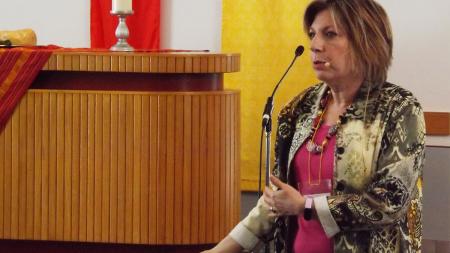South East Asian Pastors, Others Attend Summer Retreat

Youth who attended C.L.A.Y conference
Sophat Duch
A group of Christian Reformed South East Asian and Pacific Island pastors (known as SEAPI) recently met and demonstrated the opportunity summer brings for vitality and encouragement.
This group of 12-15 pastors gathered in August for their yearly retreat, and found, as is always the case, the benefit of being together and telling stories of God’s faithfulness.
The group members traveled to a retreat center called “Camp Lutherhaven,” near Fort Wayne, Ind., for a three- day retreat.
“SEAPI is a truly unique group of pastors. The members include: Indonesians, Cambodians, Vietnamese, Filipinos, Laotian, Hmong, and Samoan. They come from many geographical areas,” says Rev. Jonas Muljo, president of SEAPI and pastor of the Indonesian Protestant Church of Pomona, Calif.
SEAPI has been meeting for more than eight years. Its focus, Muljo said, is “to support each other to grow in pastoral excellence so that we can collectively prepare well the future of Asian churches in the CRCNA.”
During their time together at the retreat, the pastors prayed, laughed, shared stories, and found encouragement through Scripture.
Rev. Kou Vang, from the Hmong CRC of Sheboygan, Wisc., told of a recent trip to Cambodia and Vietnam, where his life was often at risk.
The communist government does not support his efforts of training Christians who will train others in the way of Christ, he said.
He used the Timothy Leadership Training (TLT) materials in presentations at Hanoi, Saigon, and various cities in Cambodia. The TLT program was developed by the CRC and is now used worldwide to empower biblical leadership training.
Participants at the retreat also heard from Then Duch, a former elder from the Cambodian Fellowship congregation in Holland Mich., who now lives back in Cambodia.
He spoke of church-planting efforts, encounters with tribal religions, and the blessings of God on his incarnational ministry in the northern mountain region of his native land.
His Land Cruiser in Cambodia has often become an impromptu ambulance as he has brought people from the remote mountain regions to the health-care facilities in the city, he said.
His stories entertained and amazed the pastors, including accounts of being covered with black beetles while sleeping in his remote jungle home, even with the protection of mosquito netting.
Other pastors prayed, shared Scripture, and reviewed the history of the SEAPI group, a treasured fellowship and support for the pastors that has continued with only sporadic financial support.
A highlight for all was observing and celebrating the concurrent retreat gathering of over 120 youth from the various Southeast Asian churches.
A group of nearly 20 staff has planned such a retreat on a yearly basis, under the blessing of four Hmong CRC church councils, in Sheboygan, Wisc., New Brighton, Minn., Holland Mich., and Lansing, Mich.
In recent years, the retreat has expanded beyond the Hmong youth, and is now called “C.L.A.Y.” (Christ-Like Asian Youth).
Now, second-generation youth from Cambodian, Karanese, Vietnamese, Laotian and Hmong descent all worship together and learn about being a disciple of Jesus.
Sophat Duch, president of C.L.A.Y., said the theme of this year’s conference was "Make Me, Mold Me" and it centered on Isaiah 64:8: “Yet you, Lord, are our Father. We are the clay, you are the potter; we are all the work of your hand.”
“Our banquet had the theme of ‘Cultural Unity’ where all of the campers were wearing their traditional cultural outfits,” he said.
Observing the vibrant times of youth worship, and the cultural festival and talent show, the pastors in SEAPI offered grateful prayers to a God who could put these children, descendants of people groups who not too long ago were at war, together with each other, says Miljo.
Speaking of SEAPI more broadly, Miljo says SEAPI has impacted each of the members, and ultimately their congregations, in several ways.
“We have been helped emotionally, spiritually, and intellectually,” he said.
Several years of SEAPI experiences have taught “us to listen to [one] another with more patience, understanding, and mutual respect.”
And, he said, “we have come to appreciate the place of Asian churches in the CRCNA. Participation in the group has also impacted the pastors in practical ways. We have been encouraged and motivated to build our churches and help edify the entire CRC.”
[Those who want to support CLAY, or the SEAPI group may contact Rev Jonas Muljo, (jonastri@hotmail.com), the current leader of SEAPI.]


